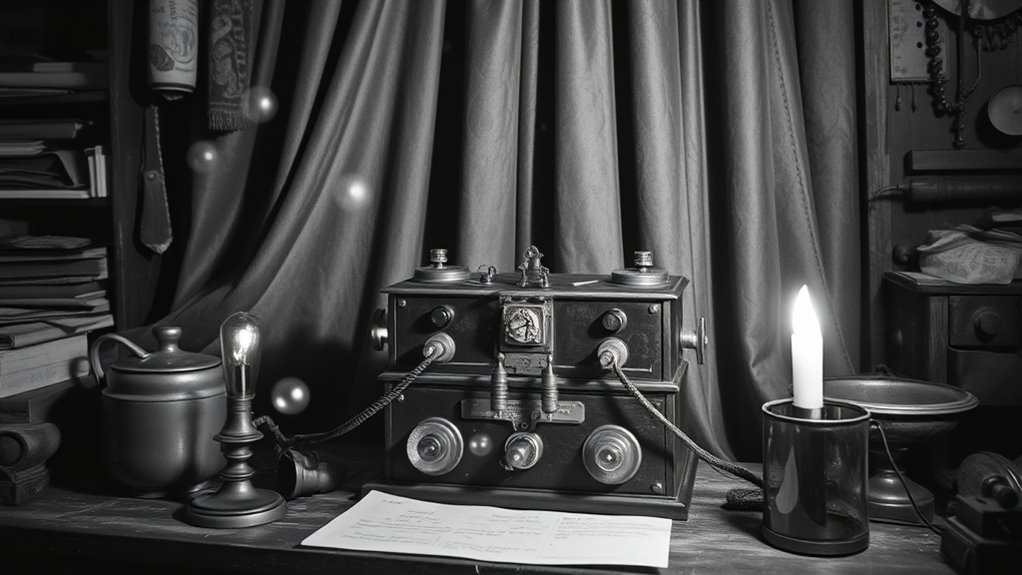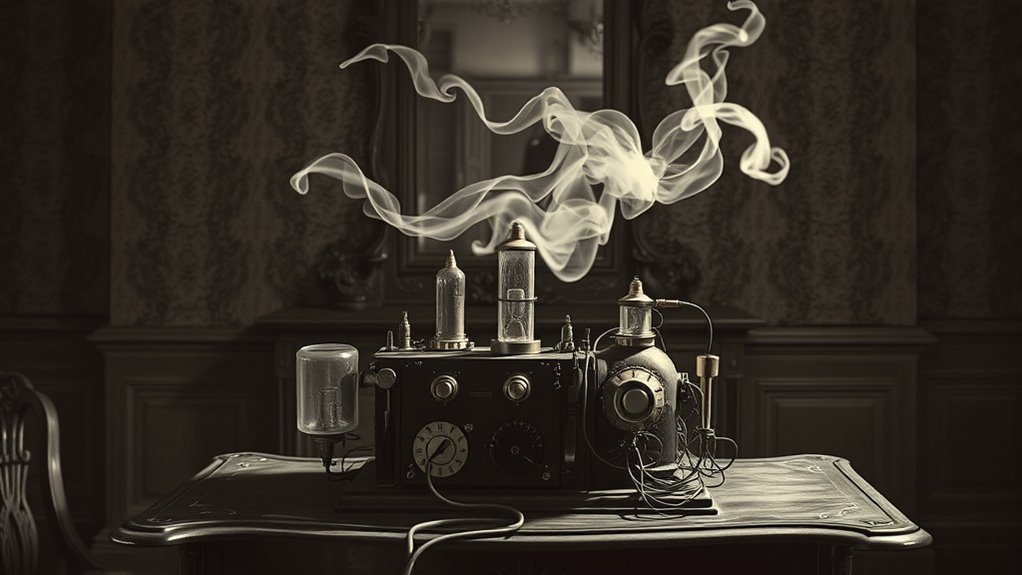In the 1920s, rumors spread that Thomas Edison was working on a “Spirit Phone,” a device that could communicate with spirits using emerging radio technology. While there’s no solid proof Edison built such a machine, his curiosity about spiritualism and pushing technological boundaries fueled these stories. If you want to explore how Edison’s inventive spirit merged with the era’s fascination with the supernatural, you’ll find intriguing insights that go beyond the myth.
Key Takeaways
- The “Spirit Phone” was a rumored device believed to enable communication with spirits using advanced technology.
- Edison’s interest in spiritualism and experiments during the 1920s fueled speculation about such a ghost gadget.
- There is little concrete evidence Edison actually built or tested a “Spirit Phone”; it remains a legend.
- The concept combined emerging radio technology with spiritualist ideas, reflecting cultural fascination with the afterlife.
- The “Spirit Phone” symbolizes Edison’s adventurous spirit and humanity’s enduring desire to connect with the supernatural.

Have you ever wondered if Thomas Edison truly believed he could contact spirits? Back in the 1920s, Edison was not just known for his groundbreaking technological innovations but also for his curiosity about spiritualism experiments. During this era, many believed in the possibility of communicating with the dead, and Edison’s interest in this field fueled speculation about his secret projects. Some thought he was working on a device—what came to be called the “Spirit Phone”—that could bridge the gap between the living and the dead. While Edison publicly focused on electrical engineering and inventions like the phonograph and electric light, whispers of his involvement in spiritual communication persisted. It’s tempting to imagine that Edison’s scientific mind sought to merge his technological expertise with the mystical domain, pushing the boundaries of what was considered possible.
Edison’s “Spirit Phone” was rumored to be a device capable of receiving messages from spirits, a kind of ghost gadget that would revolutionize spiritualism experiments. The concept was simple in theory: use advanced technology to detect and interpret signals from beyond the grave. Some believed Edison employed radio wave technology, which was still relatively new at the time, to tune into the spirits. Others speculated he was developing a device that could send and receive messages through electromagnetic signals—similar to how radios operated but with the intent of reaching the afterlife. Despite these stories, there’s little concrete evidence Edison actually built such a device. Still, the idea captured the imagination of many, blending the era’s fascination with spiritualism and the rapid pace of technological innovations.
What’s fascinating is how this idea reflects Edison’s mindset. He was always eager to explore new frontiers, often pushing the limits of science and invention. The “Spirit Phone” concept embodies that adventurous spirit—an attempt to harness technology to answer one of humanity’s oldest questions: are we truly alone? Edison’s involvement in spiritualism experiments was part of a broader cultural trend, where many prominent figures sought proof of an afterlife, often using experimental methods. The notion of a ghost gadget aligns with his reputation as an innovator willing to challenge convention and explore uncharted territory. Although no official evidence confirms Edison’s construction of such a device, the stories persist, fueling speculation about his true beliefs and the extent of his experiments.
In the end, whether Edison actually created a “Spirit Phone” or not remains uncertain. Still, it’s a compelling chapter in the story of how scientific curiosity and technological innovations can intersect with the mysterious. It reminds us that even the greatest inventors are drawn to the unknown, driven by a desire to understand what lies beyond the limits of current knowledge. Edison’s fascination with spiritualism experiments and his relentless pursuit of innovation continue to inspire questions about the boundary between science and the supernatural.
Frequently Asked Questions
Did Edison Actually Build the “Spirit Phone” Himself?
You might wonder if Edison really built the “spirit phone” himself. While he expressed interest in spiritualism debates and believed technology could connect us with the beyond, there’s no solid proof he personally created it. Skeptics argue that Edison’s experiments reflect technological skepticism, and the “spirit phone” remains more a product of speculation than confirmed invention. So, it’s unlikely he actually built it, despite his fascination with spiritual communication.
What Materials Were Allegedly Used in the Spirit Phone Device?
Spiritualist claims suggest the spirit phone device was built using a mix of ordinary and unusual materials, such as wires, crystal detectors, and early radio components. They believe these materials enabled communication with spirits. Regarding device construction, proponents say Edison’s design incorporated these elements to pick up supernatural signals. While there’s no concrete proof, the claims point to a combination of early electrical parts and mystical beliefs shaping this mysterious gadget.
Were There Any Recorded Communications Through the Spirit Phone?
Imagine stepping into a world of ghost stories where spirits supposedly communicate through strange devices. Did the spirit phone actually transmit messages? Records are scarce, and skeptics argue no verified spirit communication occurred. While enthusiasts claimed to hear voices, concrete evidence remains elusive. The allure of ghost stories continues to spark curiosity, but in reality, the spirit phone’s role as a genuine medium for ghost communication remains unproven, like a whisper in the dark.
How Did the Public React to Edison’S Ghost Communication Claims?
You might find that the public reacted with a mix of curiosity and skepticism to Edison’s ghost communication claims. Many people dismissed it as media sensationalism or a clever hoax, doubting the technology’s legitimacy. Others were intrigued and believed in the possibility of communicating with spirits. Overall, the reaction reflected a tension between scientific skepticism and fascination with the supernatural, fueling debates that persist even today.
Is There Any Scientific Evidence Supporting the Spirit Phone’S Effectiveness?
You might wonder if there’s scientific evidence backing the spirit phone’s effectiveness. In reality, paranormal investigations haven’t produced conclusive proof, and scientific skepticism remains strong. Researchers demand rigorous testing and reproducibility, which the spirit phone lacks. Without verifiable data, the device remains a fascinating but unproven concept. So, until credible scientific studies emerge, the spirit phone’s claims can’t be confidently supported by evidence.
Conclusion
You’ve seen how Edison’s “Spirit Phone” sparks curiosity and whispers of the unknown. While it may seem like chasing ghosts, it reveals our endless fascination with the mysteries beyond our reach. Sometimes, chasing after such ideas is like trying to catch lightning in a bottle—exciting but elusive. Whether real or just a dream, Edison’s gadget reminds us that the desire to connect with the beyond is a story as old as time, never truly fading away.









